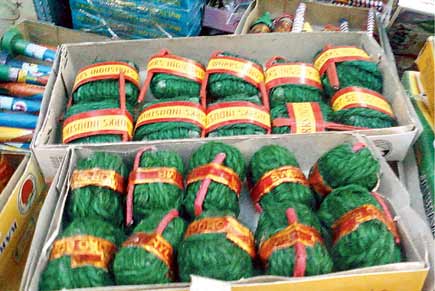Firecracker bursting during Diwali has increased the pollution level in various parts of the country, with toxic fumes from fireworks raising the particulate matter content in the air to five-six times higher than the permissible limit

New Delhi: Firecracker bursting during Diwali has increased the pollution level in various parts of the country, with toxic fumes from fireworks raising the particulate matter content in the air to five-six times higher than the permissible limit.
ADVERTISEMENT
According to the National Air Quality Index provided by the Central Pollution Control Board in ten cities, the prominent pollutant PM 2.5 was hovering between 200 and 500 in cities like Muzaffarpur, Lucknow, Faridabad, Kanpur and Agra.
The air quality was rated as 'severe' in Lucknow and Muzaffarpur and 'very poor' in Agra, Kanpur, Pune, Patna and Faridabad. Hyderabad and Chandrapur in Maharashtra recorded 'poor' air quality.
Air quality in Delhi also plunged to 'severe' level following the Diwali celebration with pollutants rising a whopping 20 times in certain areas owing to incessant fireworks and bursting of firecrackers, notwithstanding appeals by authorities.
While 'severe' air quality can affects healthy people and seriously impacts those with diseases, air rated as 'very poor' can cause respiratory illness on prolonged exposure.
"Toxic fume from cracker worsen the killer particles in the air that have already increased by 5 to 7 times than the safe standards. It also deposit deadly chemicals in our environment that will remain trapped for days," the Centre for Science and Environment said.
It said, since 2010, average Diwali pollution levels have shown very rapid build-up at least seven to eight times, but peak levels have hit ten times the standard.
"This leads to very high exposure that harm health of not only those who suffer from respiratory and cardiac problems but even that of the normal healthy people," the CSE said.
With national capital being the most polluted city, CSE analysis said that November 2015 so far has recorded higher pollution in the city than the same duration last year.
"The pollution data for the period November 1-9, 2015 and the same period last year has shown higher levels this year. The average for this period last year was 230 microgramme per cum in Delhi which has increased to 275 microgramme per cum," it said.
 Subscribe today by clicking the link and stay updated with the latest news!" Click here!
Subscribe today by clicking the link and stay updated with the latest news!" Click here!







